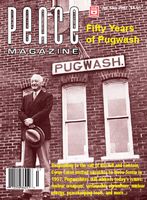
Peace Magazine Jul-Sep 2007, page 29. Some rights reserved.
Search for other articles by Mel Watkins here
By Freeman Dyson. New York: New York Review Books Collection, 2007
In January 1939 there was a meeting of physicists at George Washington University in Washington D.C., one of a series of annual meetings. Just before the meeting, the renowned and much respected Niels Bohr arrived from Copenhagen to report, breathlessly, that nuclear fission had been discovered. That meant that a nuclear weapon was possible. Yet, amazingly, there seems to have been no discussion among the assembled physicists about the ethical and moral implications of this possibility and of the need for a set of ethical guidelines that could apply to physicists around the world.
Now, one of the physicists who was not there was Joseph Rotblat. The physicist and writer Freeman Dyson, in his new book The Scientist as Rebel - reprinting an essay he first wrote for a 1999 book honoring Rotblat - wishes Rotblat had been there. Knowing what we know about the rest of his life - in 1944 he was the one and only physicist who left the Manhattan Project when it became known that Hitler was not building the bomb and then devoted his life to its abolition -- maybe he would have blown the whistle and stopped the bomb before it happened. Which, it can be agreed, would surely have mattered, making a world where there was no need for Pugwash and time could have been spent in creating the good rather than stopping the bad. The window of opportunity closed in September 1939 when Hitler invaded Poland and it was much feared by physicists in the know, many of them Jewish refugees, that the Nazis might try to build the bomb now known to be possible.
This might-have-been may seem much too hypothetical, bordering on the naÔve, but Dyson reminds us that when recombinant DNA was discovered in 1975, biologists organized an international gathering "at which they hammered out an agreement to limit and regulate the uses of the dangerous new technology." Why did physicists fail their greatest test of their humanity?
What did happen at the January 1939 meeting was a spat between Bohr and Enrico Fermi as to whether Bohr's colleague Otto Frisch or Fermi's colleague Herb Anderson should get the credit for the scientific breakthrough. This may seem like merely so-called "human nature" at work and not something worth making a great fuss about, but the counter-case is that such disputes are endemic among scholars preoccupied with professional and careerist concerns to the neglect of the good of humanity.
But would it have mattered? Was there not even then an embryonic military-industrial complex in the U.S. that would have insisted on building the bomb? In fact, that is not the way causation ran then -- or for that matter now on weapons systems in general -- a point Dyson makes: "In every country it was the scientists and not the political leaders who took the initiative to begin nuclear weapons programs." There is no way scientists themselves can evade responsibility, and they should perhaps spend more of their time talking to their colleagues who still don't get the message.
The great Einstein, though ensconced nearby at Princeton, was not present at the meeting and some may imagine that had he, the long-time pacifist, been there things would have been different. Not so, distressingly. Einstein was so far out of the loop, by choice, that as late as July 1939 he still hadn't heard about the breakthrough. He learned about it from the physicist Leo Szilard. Szilard, though in New York, had missed the January meeting because of illness. His first response on learning about what had happened was to try to get physicists in the US not to publish their research nor publicize what they were doing -- which would, of course, automatically rule out the international cooperation of physicists essential to stopping the work on the bomb.
Then Szilard, who knew Einstein --- accompanied by Edward Teller no less -- went to see him to make sure President Roosevelt knew what had happened. Like Szilard, Einstein was so afraid of what would happen if Hitler acted first that he lent his name and reputation to a letter pressing FDR to act. It is a stunning example of how violence (even its prospect) begets violence, of how evil begets evil.
We continue to be influenced by such fears and seem destined to do so indefinitely. Scientists did not just not blow the whistle, they did their best to make it all happen. It's unlikely Rotblat could have stopped such a steamroller, but it is the only straw at which to grasp.
Reviewed by Melville Watkins, professor emeritus, University of Toronto.

Peace Magazine Jul-Sep 2007, page 29. Some rights reserved.
Search for other articles by Mel Watkins here